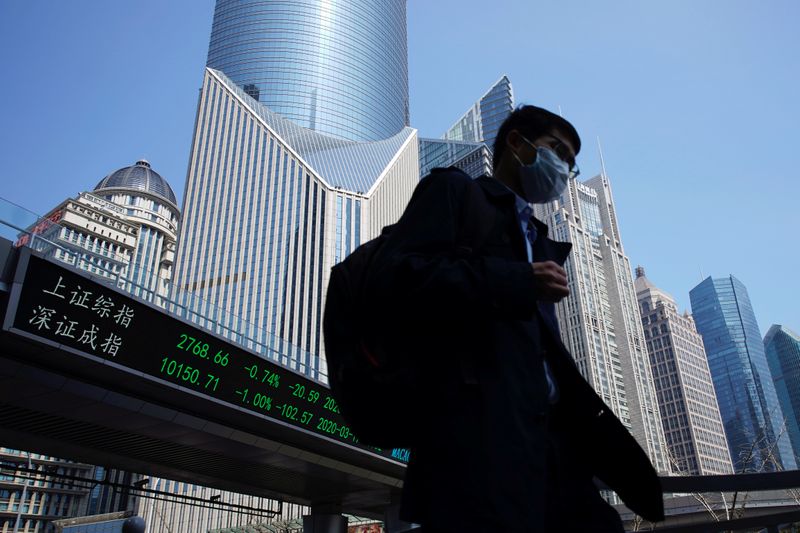By Herbert Lash
NEW YORK (Reuters) - Stocks on Wall Street slid while crude prices edged higher on Monday as a global deal on record output cuts failed to quell concerns on whether the pact is enough to head off an oil glut as the coronavirus pandemic hammers economies worldwide.
Gold prices edged higher to hit a more than one-month peak and the dollar traded little changed, with volume thin due to the Easter Monday holiday across Europe and parts of Asia, with markets in Australia, New Zealand and Hong Kong also closed.
U.S. Treasury yields rose as the cut to global oil output addressed a glut that has damaged the energy sector but reminded investors of the sharp economic contraction countries face.
Britain's finance minister told colleagues the UK's economy could shrink by 25% to 30% between April and June because of the coronavirus lockdown, the Times newspaper reported.
The slump in China's exports is expected to have extended into March, while a collapse in oil prices likely deepened a decline in imports, a Reuters poll showed.
Chinese exports are expected to have fallen 14% in March from a year earlier, slowing the downturn somewhat from a 17.2% contraction in the January-February period. Imports are set to have shrunk 9.5% from a year earlier, the sharpest drop since July 2016 and deeper than a 4.0% decline in January-February.
"The market wants to find confidence in some of the recent developments, but I still think it's going to be a very long slog," said Gennadiy Goldberg, senior rates strategist at TD Securities in New York.
MSCI's gauge of stocks across the globe (MIWD00000PUS) shed 1.11% and its emerging market stock index lost 0.73%.
On Wall Street, the Dow Jones Industrial Average (DJI) fell 438.7 points, or 1.85%, to 23,280.67. The S&P 500 (SPX) lost 44.46 points, or 1.59%, to 2,745.36 and the Nasdaq Composite (IXIC) dropped 51.93 points, or 0.64%, to 8,101.65.
Corporate America reports first-quarter results this week, starting what is expected to be a painful quarterly earnings season due to the coronavirus pandemic.
Earnings for S&P 500 firms are expected to tumble 9.0% in the first quarter, compared with a Jan. 1 forecast of a 6.3% rise, before plummeting 20.7% in the second quarter as sweeping lockdowns halt business activity and spark furloughs.
The outbreak could reach its U.S. peak this week, a top health official said, as the White House considers when and how to lift stay-at-home restrictions.
The United States, with the world's third-largest population, has recorded more fatalities from COVID-19 than any other country, more than 22,000 as of Monday morning, according to a Reuters tally.
The Nikkei (N225) fell 1.9% overnight in Japan and South Korean shares (KS11) dropped 1.3%, while China's CSI300 index (CSI300) lost 0.5%.
Oil prices have slumped more than 50% from their January peak as the coronavirus pandemic hit fuel demand.
International benchmark Brent futures (LCOc1) rose 50 cents to $31.98 per barrel but were trading below the day's highs.
U.S. West Texas Intermediate (WTI) crude futures (CLc1) were up 32 cents at $23.08 per barrel in a volatile session, having fallen more than 3% to $22.03 earlier in the day.
The dollar index (=USD) rose 0.007% and the Japanese yen
Gold rose, as it is seen as a store of value when inflation pressures are rising.
Central banks are doing everything in their power to support the stock market and economy, which will eventually lead to inflation, said Phil Streible, chief market strategist at Blue Line Futures in Chicago.
"Yields on debt instruments are virtually zero, which increases physical demand for gold and silver as a safe-haven asset," Streible said.
